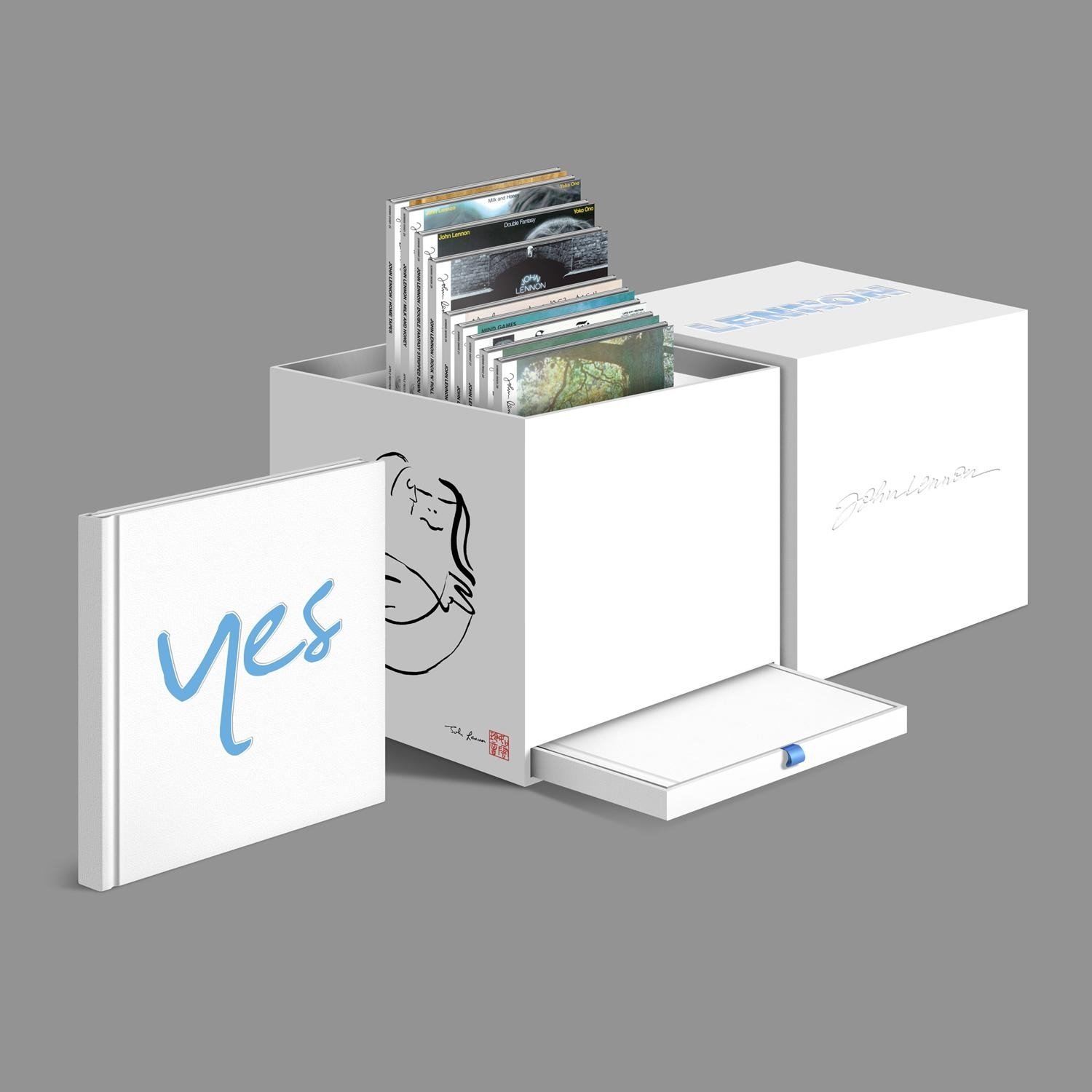
John Lennon – Signature Box (2010/2014)
11 Discs | FLAC (tracks) 24 bit/96 kHz | Time – 451:10 minutes | 8,87 GB
Studio Master, Official Digital Download Artwork: Full Digital Booklet(s)
Originally released in 2010, the John Lennon Signature Box is an acclaimed collection that includes the eight remastered albums and an EP of Lennon’s non-album singles, all newly remastered in hi-res 96kHz/24bit digital resolution, plus several rarities available exclusively within the box set in 44.1kHz/24bit digital resolution.
The crown jewel in Apple/EMI’s extensive 2010 John Lennon remasters series, Signature Box contains all of the solo studio albums Lennon released during his lifetime (minus the trio of experimental duet LPs with Yoko Ono released on Apple and Zapple), his first posthumous album Milk and Honey, a disc of non-LP singles, a disc of home demos, but not the 2010 showcase item Double Fantasy Stripped Down, which is available only as a bonus on the indvidual reissue of Double Fantasy. It is, in other words, close enough to complete to perhaps invite a little bit of quibbling about what is absent — Live Peace in Toronto could fit in nicely with this batch and there are outtakes from Menlove Ave missing but the real niggling comes with the home demo disc, which emphasizes demos and alternate takes of songs from Plastic Ono Band and Imagine, leaving behind demos of songs Lennon gave away, including “I’m the Greatest” and “Goodnight Vienna,” which he handed over to Ringo, and songs that never made it to one of his records. Ultimately, this is nitpicking because Signature Box is handsomely produced and contains the best-sounding Lennon remasters — remastered by the team that did the acclaimed 2009 Beatles remasters, using the original mixes, not the recent remixes — which is enough to make this more than worthwhile for the serious Lennon fan.
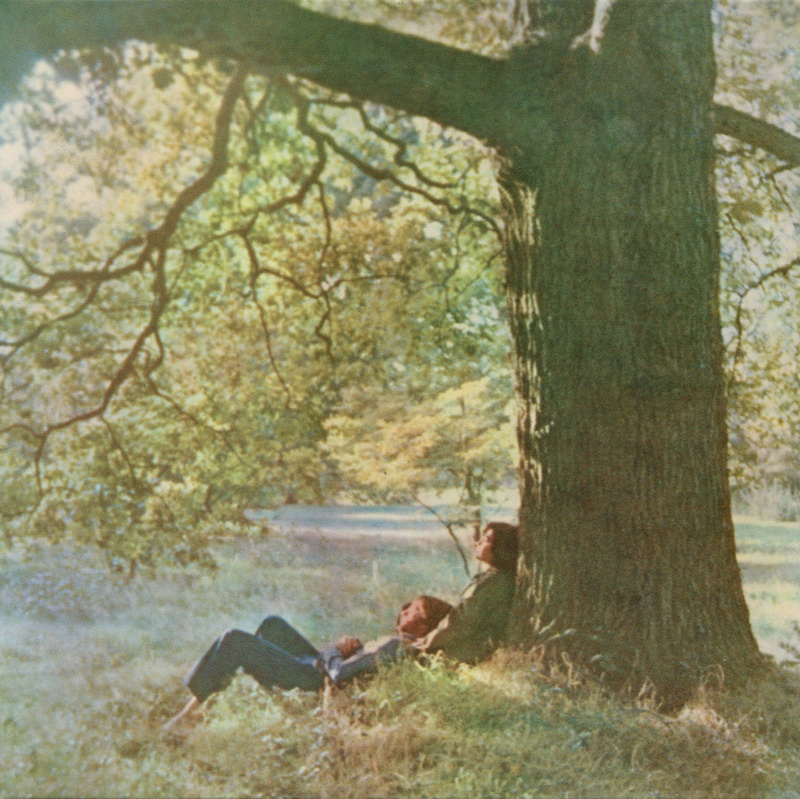
John Lennon/Plastic Ono Band – John Lennon/Plastic Ono Band (1970/2014)
FLAC (tracks) 24-bit/96 kHz | Time – 39:33 minutes | 840 MB
Studio Master, Official Digital Download | Artwork: Digital booklet
John Lennon/Plastic Ono Band is the debut solo album by John Lennon. Produced by Lennon, Yoko Ono, and Phil Spector, the album was recorded at Abbey Road Studios and Ascot Sound Studios and used the same musicians and production team as Yoko Ono’s album Yoko Ono/Plastic Ono Band. Considered to be one of Lennon’s best solo albums, John Lennon/Plastic Ono Band was ranked at #23 by Rolling Stone magazine on their list of The 500 Greatest Albums of All Time.
The cliché about singer/songwriters is that they sing confessionals direct from their heart, but John Lennon exploded the myth behind that cliché, as well as many others, on his first official solo record, John Lennon/Plastic Ono Band. Inspired by his primal scream therapy with Dr. Arthur Janov, Lennon created a harrowing set of unflinchingly personal songs, laying out all of his fears and angers for everyone to hear. It was a revolutionary record — never before had a record been so explicitly introspective, and very few records made absolutely no concession to the audience’s expectations, daring the listeners to meet all the artist’s demands. Which isn’t to say that the record is unlistenable. Lennon’s songs range from tough rock & rollers to piano-based ballads and spare folk songs, and his melodies remain strong and memorable, which actually intensifies the pain and rage of the songs. Not much about Plastic Ono Band is hidden. Lennon presents everything on the surface, and the song titles — “Mother,” “I Found Out,” “Working Class Hero,” “Isolation,” “God,” “My Mummy’s Dead” — illustrate what each song is about, and charts his loss of faith in his parents, country, friends, fans, and idols. It’s an unflinching document of bare-bones despair and pain, but for all its nihilism, it is ultimately life-affirming; it is unique not only in Lennon’s catalog, but in all of popular music. Few albums are ever as harrowing, difficult, and rewarding as John Lennon/Plastic Ono Band.
Tracklist:
01 – Mother
02 – Hold On
03 – I Found Out
04 – Working Class Hero
05 – Isolation
06 – Remember
07 – Love
08 – Well Well Well
09 – Look At Me
10 – God
11 – My Mummy’s Dead
Personnel:
John Lennon – lead and backing vocals, acoustic/electric guitars, piano/organ
Ringo Starr – drums
Klaus Voormann – bass
Phil Spector – piano on “Love”
Billy Preston – piano on “God”
Yoko Ono – “wind”
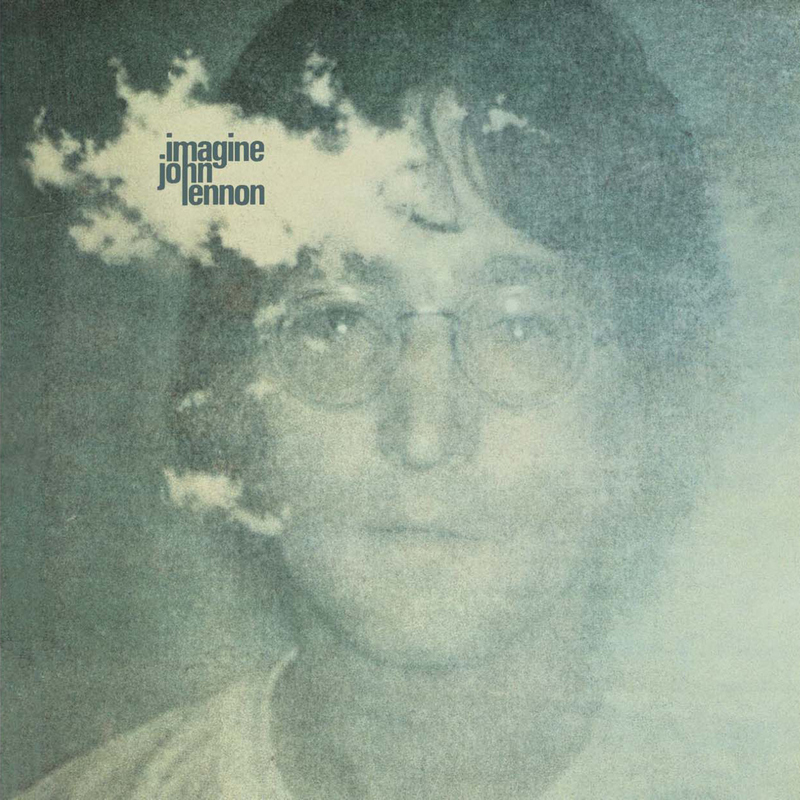
John Lennon – Imagine (1971/2014)
FLAC (tracks) 24-bit/96 kHz | Time – 39:43 minutes | 861 MB
Studio Master, Official Digital Download | Artwork: Digital booklet
John’s first post-Beatles album, John Lennon/Plastic Ono Band, had emerged in late 1970 to critical praise but only muted approval in the marketplace. The conclusions were, to him, pretty obvious. He might be a trail-blazer in all kinds of ways, but he was at heart a populist – an artist but also an entertainer. The task was to frame his deas in music that listeners loved and took inside their hearts Plastic Ono Band had been admired, but often from a distance. The role of the next album – the record that became Imagine – was an attempt for maximum communication offering hopes to the bleeding, battered world. On the musical level he certainly succeeded. Imagine is the best-loved album of his solo career, while its title track is perhaps his most revered. By contrast to its austere predecessor the new music had melodies in abundance, and colour and variety. It had flashes of broad humour and moments of absolute joy.
After the harrowing Plastic Ono Band, John Lennon returned to calmer, more conventional territory with Imagine. While the album had a softer surface, it was only marginally less confessional than its predecessor. Underneath the sweet strings of “Jealous Guy” lies a broken and scared man, the jaunty “Crippled Inside” is a mocking assault at an acquaintance, and “Imagine” is a paean for peace in a world with no gods, possessions, or classes, where everyone is equal. And Lennon doesn’t shy away from the hard rockers — “How Do You Sleep” is a scathing attack on Paul McCartney, “I Don’t Want to Be a Soldier” is a hypnotic antiwar song, and “Give Me Some Truth” is bitter hard rock. If Imagine doesn’t have the thematic sweep of Plastic Ono Band, it is nevertheless a remarkable collection of songs that Lennon would never be able to better again.
Tracklist:
01 – Imagine
02 – Crippled Inside
03 – Jealous Guy [feat. The Plastic Ono Band & The Flux Fiddlers]04 – It’s So Hard
05 – I Don’t Wanna Be A Soldier Mama
06 – Gimme Some Truth
07 – Oh My Love
08 – How Do You Sleep?
09 – How?
10 – Oh Yoko!
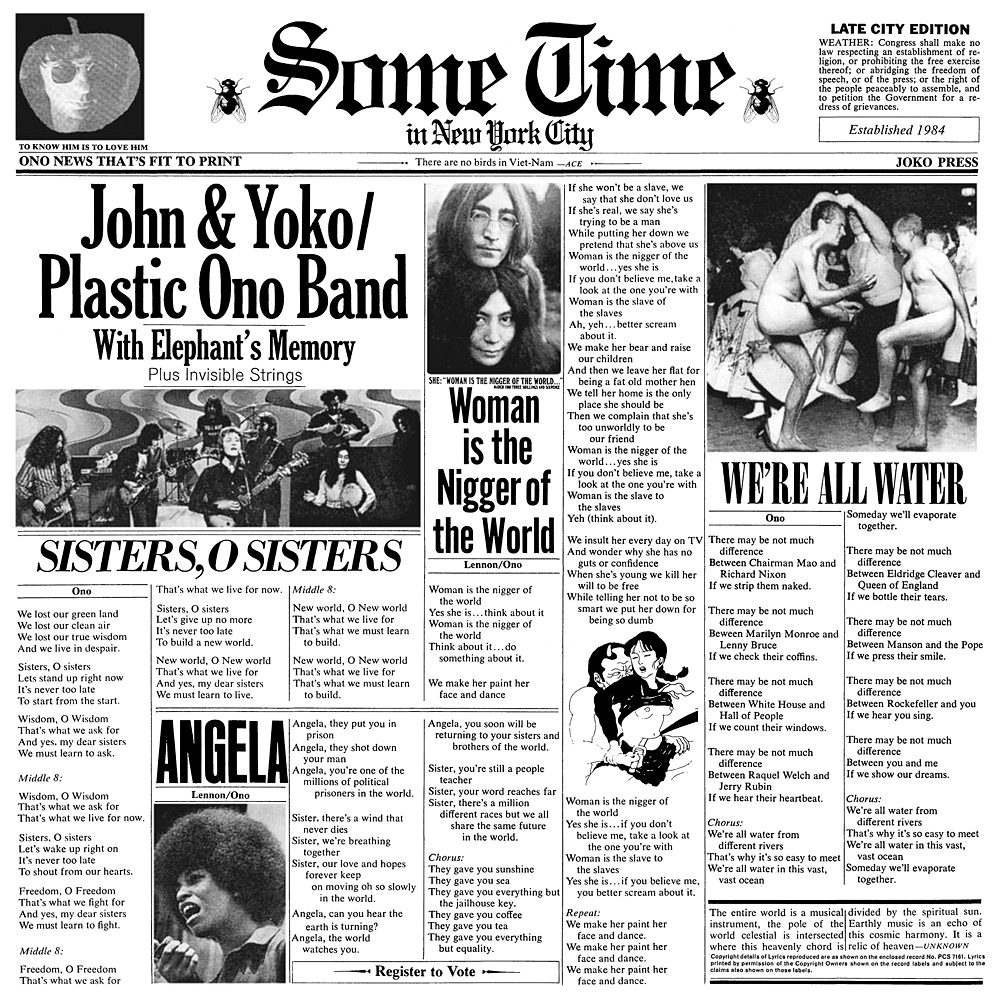
John Lennon, Yoko Ono – Sometime In New York City (1972/2014)
FLAC (tracks) 24-bit/96 kHz | Time – 91:13 minutes | 1,95 GB
Studio Master, Official Digital Download | Artwork: Digital booklet
Some Time In New York City was originally released in 1972 and is John Lennon’s third post-Beatles solo album, as well as his fifth album with Yoko Ono. Produced by Phil Spector, the album did not fare as well as Lennon’s two previous solo albums, John Lennon/Plastic Ono Band and Imagine.
The first album co-billed to John Lennon and Yoko Ono to actually contain recognizable pop music, Some Time in New York City found the Lennons in an explicitly political phase. This was understandable — at the time, Lennon was neck-deep in his struggle to remain in the United States, a conflict rooted in his antiwar and antiestablishment politics and the enmity of the Nixon administration. At the same time, having written, recorded, and released the music on the Plastic Ono Band and Imagine albums — and musically exorcising many of the emotional demons associated with aspects of his past, and working out a musical and publishing “divorce” from Paul McCartney — he was now reveling in the freedom of being an ex-Beatle and exploring music and other subjects that he’d never felt fully free to delve into during the first decade of his career. This album was actually a long time in coming, as there had been hints of Lennon moving in this direction for years — he’d long looked upon Bob Dylan with unabashed envy, emulating his sound at moments (“You’ve Got to Hide Your Love Away”) and striving for some of the same mix of edginess and depth, once the group got beyond its original two-guitars-bass-drums and love songs sound; “Revolution” (and “Revolution No. 1″) and the anthems “Give Peace a Chance” and “Power to the People” saw him trying to embrace outside subjects in his work, and Some Time in New York City carried his writing a step further in this direction, introducing John Lennon, protest singer — true, he was ten years late, in terms of the musical genre (even Joan Baez and Judy Collins were doing pop-style records by then), but it was a logical development given the time in Lennon’s life and the strife-filled era with which it coincided. Seeking his own voice in all of its permutations, and living amid the bracing pace of New York City (which made London, much less Liverpool, look like a cultural and political backwater), Lennon entered a phase similar to Dylan’s 1963-1964 period, represented by songs such as “The Ballad of Hollis Brown,” “The Death of Emmett Till,” and “Talking John Birch Society Blues.” Except that where Dylan had toned down that side of his work, never officially releasing his versions of two of those songs (the two most confrontational, in fact), Lennon didn’t hold back, delivering his topical songs with both barrels smoking, expounding on such topical subjects as radical feminism, the Attica prison riot, the treatment of activists John Sinclair and Angela Davis, and the rising strife in Northern Ireland (which was on its way to becoming for the British the same kind of military and political quagmire that Vietnam was for America). Lennon had some advantages in getting heard, as an ex-Beatle, not an up-and-coming talent as Dylan had been a decade earlier, and if the subject matter of his new songs puzzled or alienated some fans, he also still had a huge amount of rock & roll street cred, which was only enhanced at the time by his having made Nixon’s enemies list; at the time, there were a lot of people to whom that mattered more than his past as a Beatle — at the April 24 antiwar rally in New York in 1971, where he appeared with Yoko Ono and the Elephant’s Memory Band, he showed himself to be among the few musicians who could get a quarter of a million or more people singing and chanting spontaneously, in unison. And Some Time in New York City was a logical progression from that event. Especially in the case of Lennon’s songs, there is an appealing rock style to the material here, even if the lyrics limit the record’s appeal. And even Yoko’s songs have something to recommend them, “Sisters, O Sisters” representing a peculiar form of reggae-pop, “Born in a Prison” possessing a strange pop ambience, and “We’re All Water” offering a preview of late-’70s punk/new wave rawness (Lena Lovich may well have worn out that track). At the time of its release in June of 1972, all except the most devoted fans were put off by the album’s topicality and in-your-face didacticism, and the bonus live disc was challenging in other ways. Heard today, the studio disc rocks in enough of the right places, as well as drawing on influences ranging from blues to reggae, to surprise listeners and even delight them — the relatively tuneless “Sunday, Bloody Sunday” manages to favorably recall elements of “Come Together,” and both it and “New York City” have some of the best electric guitar ever heard on a Lennon album, while “John Sinclair” shows off Lennon’s blues playing (on a steel National guitar, no less) brilliantly. Even those who were of the left at the time may wince at “Angela” some decades on, but “We’re All Water” has lost none of its intellectual or musical resonances, even if Nixon and Mao are long dead. The Elephant’s Memory Band may not be the best set of musicians that Lennon could have been working with, but that was less important than the fact that he seemed to respond to their club band R&B and jazz background with a roots-oriented approach to songwriting that’s ultimately refreshing. Co-producer Phil Spector gives most of the music a larger-than-life ambience, with a reverb-drenched, rhythm-heavy approach recalling his Wall of Sound productions, which gives a lot of even the most didactic songs a big-band pop/rock smoothness, when the songs weren’t lean and stripped down like “John Sinclair” (which sounds in terms of texture like a Furry Lewis side from 1930). Some Time in New York City was released with a “free” bonus disc containing a live medley of Lennon’s “Cold Turkey” and Ono’s “Don’t Worry Kyoko,” from an antiwar rally at the Lyceum in London with George Harrison, and an appearance by the Lennons at a Mothers of Invention concert from the Fillmore East. The Lyceum tracks were well recorded and, apart from both going on too long, exude a certain power; these may not be the songs you’d have had performed at the one recorded post-Beatles concert appearance by Lennon and Harrison, but “Cold Turkey” is good, if a little disorganized near the end, and “Don’t Worry Kyoko” has some pretty fair rock & roll jamming going on behind Ono’s vocal acrobatics; the Fillmore stuff sounds less good technically, and captures a spontaneous moment that’s mostly wasted, though not without a moment of personal musical reflection from Lennon in “Well (Baby Please Don’t Go).” Alas, the presence of the second disc now makes this the most expensive of all Lennon’s CD releases, virtually ensuring that it remain the least known of his mainline albums, especially for any fans who weren’t around in 1972.
Tracklist:
CD1:
01 – Woman Is The Nigger Of The World
02 – Sisters, O Sisters
03 – Attica State
04 – Born In A Prison
05 – New York City
06 – Sunday Bloody Sunday
07 – The Luck Of The Irish
08 – John Sinclair
09 – Angela
10 – We’re All Water
CD2 (Live Jam):
01 – Cold Turkey (Live)
02 – Don’t Worry Kyoko (Live)
03 – Well (Baby Please Don’t Go) (Live)
04 – Jamrag (Live)
05 – Scumbag (Live)
06 – Au (Live)
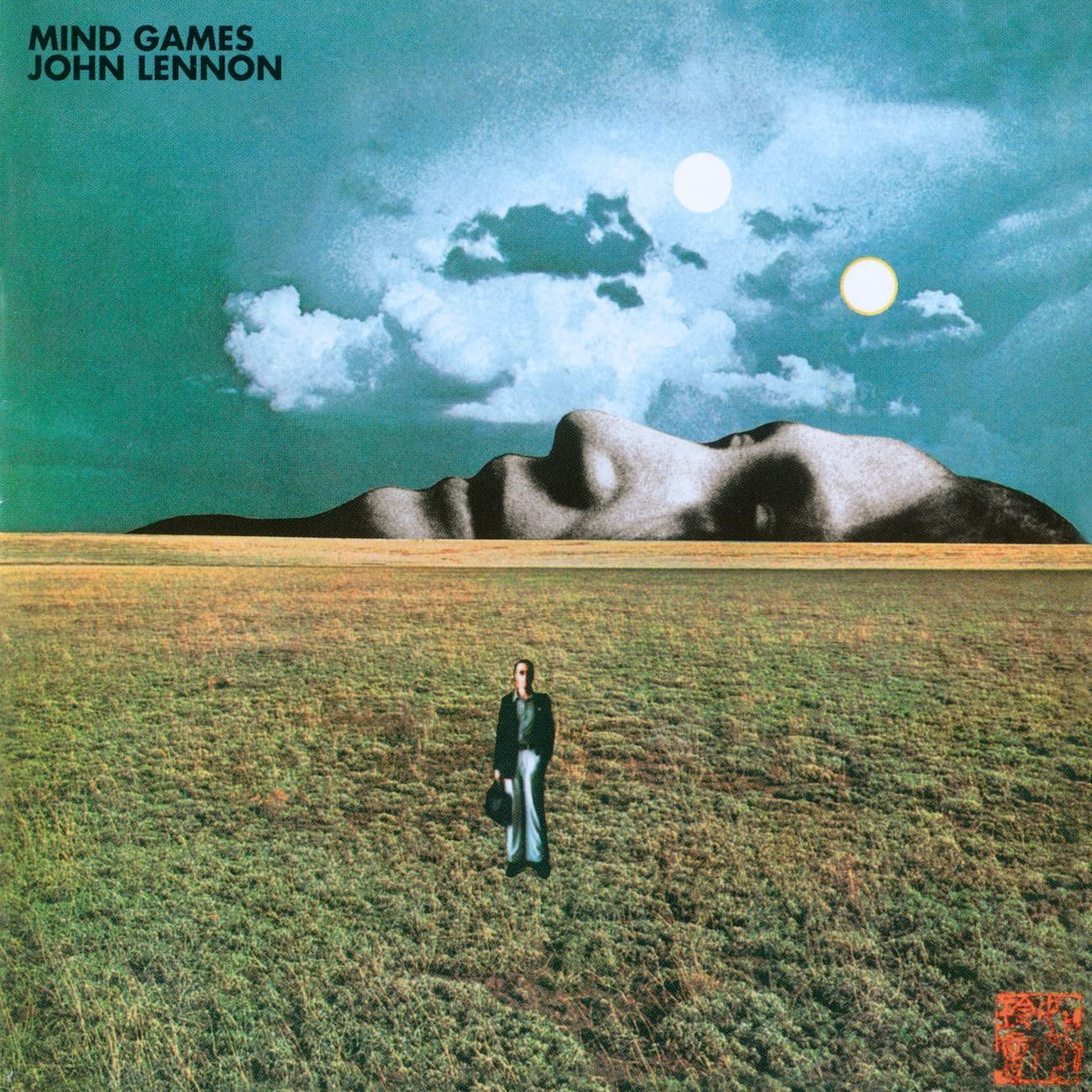
John Lennon – Mind Games (1973/2014)
FLAC (tracks) 24-bit/96 kHz | Time – 41:01 minutes | 870 MB
Studio Master, Official Digital Download | Artwork: Front cover
John Lennon’s Mind Games was recorded and released in 1973. The album was Lennon’s first self-produced album and although it was initially poorly-received by critics, it was eventually met with favorable reviews. Mind Games reached #13 on the UK charts and #9 in the US, where it was also certified gold. Lennon wrote all of the songs for the album in one week, and the album was recorded in July and August of 1973.
After the hostile reaction to the politically charged Sometime in New York City, John Lennon moved away from explicit protest songs and returned to introspective songwriting with Mind Games. Lennon didn’t leave politics behind — he just tempered his opinions with humor on songs like “Bring on the Lucie (Freda Peeple),” which happened to undercut the intention of the song. It also indicated the confusion that lies at the heart of the album. Lennon doesn’t know which way to go, so he tries everything. There are lovely ballads like “Out of the Blue” and “One Day (At a Time),” forced, ham-fisted rockers like “Meat City” and “Tight A$,” sweeping Spectoresque pop on “Mind Games,” and many mid-tempo, indistinguishable pop/rockers. While the best numbers are among Lennon’s finest, there’s only a handful of them, and the remainder of the record is simply pleasant. But compared to Sometime in New York City, as well as the subsequent Walls and Bridges, Mind Games sounded like a return to form.
Tracklist:
01 – Mind Games
02 – Tight A$
03 – Aisumasen (I’m Sorry)
04 – One Day (At A Time)
05 – Bring On The Lucie (Freda Peeple)
06 – Nutopian International Anthem
07 – Intuition
08 – Out The Blue
09 – Only People
10 – I Know (I Know)
11 – You Are Here
12 – Meat City
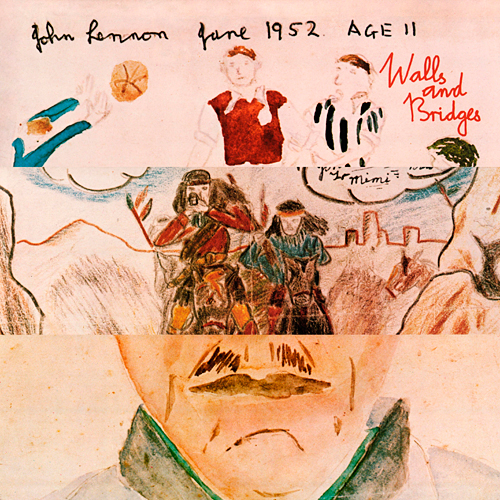
John Lennon – Walls And Bridges (1974/2014)
FLAC (tracks) 24-bit/96 kHz | Time – 46:21 minutes | 992 MB
Studio Master, Official Digital Download | Artwork: Digital booklet
Walls and Bridges was recorded during John Lennon’s infamous “lost weekend,” as he exiled himself in California during a separation from Yoko Ono. Lennon’s personal life was scattered, so it isn’t surprising that Walls and Bridges is a mess itself, containing equal amounts of brilliance and nonsense. Falling between the two extremes was the bouncy Elton John duet “Whatever Gets You Thru the Night,” which was Lennon’s first solo number one hit. Its bright, sunny surface was replicated throughout the record, particularly on middling rockers like “What You Got” but also on enjoyable pop songs like “Old Dirt Road.” However, the best moments on Walls and Bridges come when Lennon is more open with his emotions, like on “Going Down on Love,” “Steel and Glass,” and the beautiful, soaring “No. 9 Dream.” Even with such fine moments, the album is decidedly uneven, containing too much mediocre material like “Beef Jerky” and “Ya Ya,” which are weighed down by weak melodies and heavy over-production. It wasn’t a particularly graceful way to enter retirement.
Tracklist:
01 – Going Down On Love
02 – Whatever Gets You Thru The Night
03 – Old Dirt Road
04 – What You Got
05 – Bless You
06 – Scared
07 – #9 Dream
08 – Surprise Surprise (Sweet Bird Of Paradox)
09 – Steel And Glass
10 – Beef Jerky
11 – Nobody Loves You (When You’re Down And Out)
12 – Ya Ya
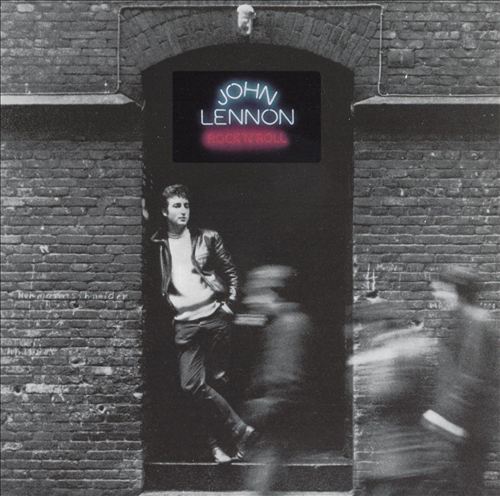
John Lennon – Rock ‘N’ Roll (1975/2014)
FLAC (tracks) 24-bit/96 kHz | Time – 39:49 minutes | 822 MB
Studio Master, Official Digital Download | Artwork: Front cover
Rock’N’Roll has one of the strangest back-stories in music folklore. From its unpromising origins in a legal morass and months of drunken time-wasting, John rescued this sparkling tribute to the bygone era that he adored. Its tracks were all cover versions, and hardly the mass anthems or scarred confessionals Lennon was known for. Yet Rock’N’Roll was both revealing and delightful. These same tracks resurrected the leather-clad, greasy-quiffed Liverpool teenager who still lived inside John Lennon’s head…
Although the chaotic sessions that spawned this album have passed into rock & roll legend and the recording’s very genesis (as an out-of-court settlement between John Lennon and an aggrieved publisher) has often caused it to be slighted by many of the singer’s biographers, Rock ‘n’ Roll, in fact, stands as a peak in his post-Imagine catalog: an album that catches him with nothing to prove and no need to try. Lennon could, after all, sing old rock & roll numbers with his mouth closed; he spent his entire career relaxing with off-the-cuff blasts through the music with which he grew up, and Rock ‘n’ Roll emerges the sound of him doing precisely that. Four songs survive from the fractious sessions with producer Phil Spector in late 1973 that ignited the album, and listeners to any of the posthumous compilations that also draw from those archives will know that the best tracks were left on the shelf — “Be My Baby” and “Angel Baby” among them. But a gorgeous run through Lloyd Price’s “Just Because” wraps up the album in fine style, while a trip through “You Can’t Catch Me” contrarily captures a playful side that Lennon rarely revealed on vinyl. The remainder of the album was cut a year later with Lennon alone at the helm, and the mood remains buoyant. It might not, on first glance, seem essential to hear him running through nuggets like “Be Bop A Lula,” “Peggy Sue,” and “Bring It on Home to Me,” but, again, Lennon has seldom sounded so gleeful as he does on these numbers, while the absence of the Spector trademark Wall-of-Sound production is scarcely noticeable — as the object of one of Lennon’s own productions, David Peel once pointed out, “John had the Wall of Sound down perfectly himself.” Released in an age when both David Bowie and Bryan Ferry had already tracked back to musical times-gone-by (Pin-Ups and These Foolish Things, respectively), Rock ‘n’ Roll received short shrift from contemporary critics. As time passed, however, it has grown in stature, whereas those other albums have merely held their own. Today, Rock ‘n’ Roll sounds fresher than the rock & roll that inspired it in the first place. Imagine that.
Tracklist:
01 – Be-Bop-A-Lula
02 – Stand By Me
03 – Rip It Up / Ready Teddy
04 – You Can’t Catch Me
05 – Ain’t That A Shame
06 – Do You Want To Dance
07 – Sweet Little Sixteen
08 – Slippin’ And Slidin’
09 – Peggy Sue
10 – Bring It On Home To Me / Send Me Some Lovin’
11 – Bony Moronie
12 – Ya Ya
13 – Just Because
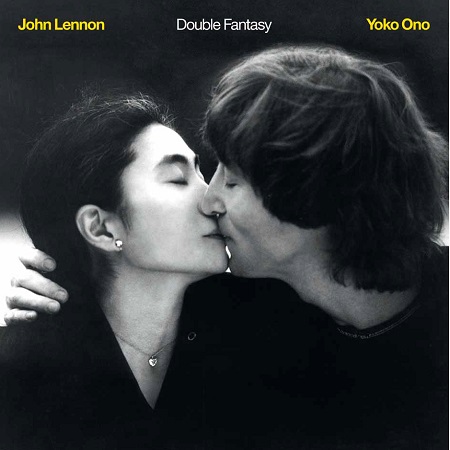
John Lennon, Yoko Ono – Double Fantasy (1980/2014)
FLAC (tracks) 24-bit/96 kHz | Time – 45:11 minutes | 965 MB
Studio Master, Official Digital Download | Artwork: Digital booklet
The most distinctive thing about Double Fantasy, the last album John Lennon released during his lifetime, is the very thing that keeps it from being a graceful return to form from the singer/songwriter, returning to active duty after five years of self-imposed exile. As legend has it, Lennon spent those years in domestic bliss, being a husband, raising a baby, and, of course, baking bread. Double Fantasy was designed as a window into that bliss and, to that extent, he decided to make it a joint album with Yoko Ono, to illustrate how complete their union was. For her part, Ono decided to take a stab at pop and while these are relatively tuneful for her, they nevertheless disrupt the feel and flow of Lennon’s material, which has a consistent tone and theme. He’s surprisingly sentimental, not just when he’s expressing love for his wife (“Dear Yoko,” “Woman”) and child (“Beautiful Boy [Darling Boy]”), but when he’s coming to terms with his quiet years (“Watching the Wheels,” “Cleanup Time”) and his return to creative life. These are really nice tunes, and what’s special about them is their niceness — it’s a sweet acceptance of middle age, which, of course, makes his assassination all the sadder. For that alone, Double Fantasy is noteworthy, yet it’s hard not to think that it’s a bit of a missed opportunity — primarily because its themes would be stronger without the Ono songs, but also because the production is just a little bit too slick and constrained, sounding very much of its time. Ultimately, these complaints fall by the wayside because Lennon’s best songs here cement the last part of his legend, capturing him at peace and in love. According to some reports, that perception was a bit of a fantasy, but sometimes the fantasy means more than the reality, and that’s certainly the case here.
Tracklist:
01 – (Just Like) Starting Over
02 – Kiss Kiss Kiss
03 – Cleanup Time
04 – Give Me Something
05 – I’m Losing You
06 – I’m Moving On
07 – Beautiful Boy (Darling Boy)
08 – Watching The Wheels
09 – Yes, I’m Your Angel
10 – Woman
11 – Beautiful Boys
12 – Dear Yoko
13 – Every Man Has A Woman Who Loves Him
14 – Hard Times Are Over
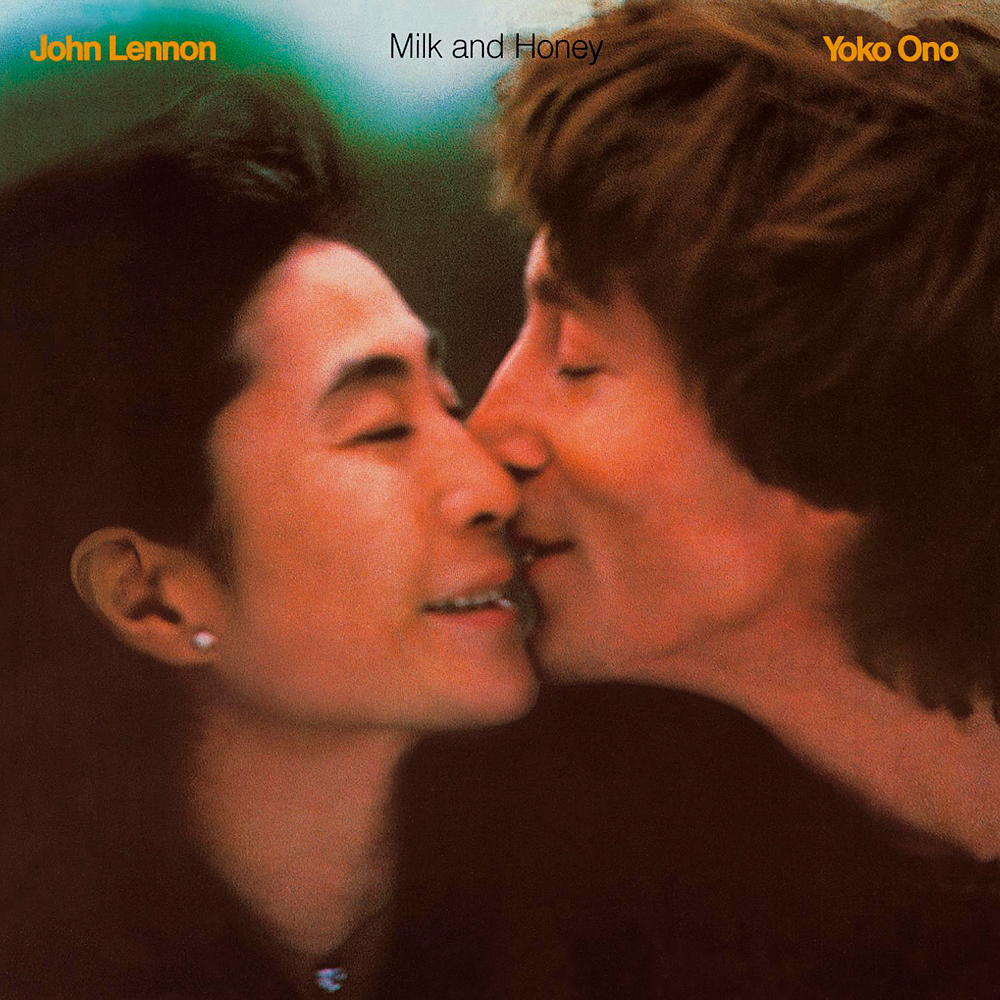
John Lennon, Yoko Ono – Milk And Honey (1984/2014)
FLAC (tracks) 24-bit/96 kHz | Time – 36:49 minutes | 740 MB
Studio Master, Official Digital Download | Artwork: Digital booklet
Milk and Honey was released in 1984, nearly four years after John Lennon’s death. It was created by John Lennon and Yoko Ono in the last months of Lennon’s life, during and following the sessions for Double Fantasy. The album was assembled by Yoko Ono, and features a number of songs presented in their demo form.
The sessions for 1980’s Double Fantasy were supposed to yield two albums, the second to be released at a future time, but Lennon’s assassination tragically halted the project in its tracks. A bit over three years later, Yoko Ono issued tapes of many of the songs planned for that album under the title Milk and Honey, laid out in the same John-Yoko-John-Yoko dialogue fashion as its predecessor. Not unexpectedly, it’s a rougher, less polished product, lacking the finishing touches and additional takes that Lennon most likely would have called for. Nevertheless, Lennon’s songs at this point in their development were often quite strong, tougher than those on Double Fantasy in general, and the ad libs and studio chatter that might not have made the final cut give us more of a glimpse of Lennon’s delightfully quirky personality. “Nobody Told Me,” the advance single off the album, is a rollicking, quizzical piece of work, maybe the best thing to come out of John’s 1980 sessions, despite the unfinished-sounding transition to the chorus. “Borrowed Time,” another single, is a thoughtful, sparely worded meditation on growing older attached to a Caribbean beat. Yoko’s contributions, while not as strong as John’s, are surprisingly listenable — the reggae-based “Don’t Be Scared,” in particular — and more current in texture, and her lyrics do tend to answer John’s songs. As the album comes toward the close, the tone turns sentimental, culminating with one of John’s loveliest tunes, “Grow Old With Me,” as presented on a home-recorded cassette in lieu of a studio recording. The ironies of this song and some of the other Lennon material are obviously poignant in the light of the cruel events of December 8, 1980; that and the fact that these songs haven’t been as exposed as much as those on Double Fantasy lead some to prefer this sequel.
Tracklist:
01 – John Lennon – I’m Stepping Out
02 – Yoko Ono – Sleepless Night
03 – John Lennon – I Don’t Wanna Face It
04 – Yoko Ono – Don’t Be Scared
05 – John Lennon – Nobody Told Me
06 – Yoko Ono – O’Sanity
07 – John Lennon – Borrowed Time
08 – Yoko Ono – Your Hands
09 – John Lennon – (Forgive Me) My Little Flower Princess
10 – Yoko Ono – Let Me Count The Ways
11 – John Lennon – Grow Old With Me
12 – Yoko Ono – You’re The One
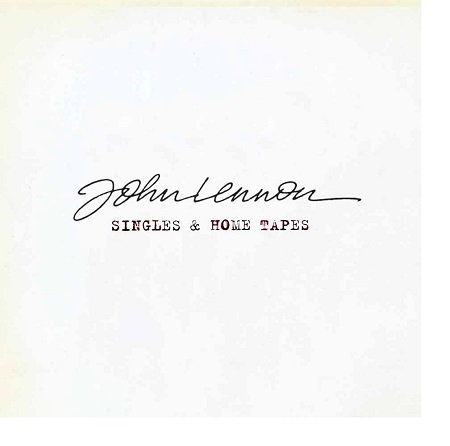
John Lennon – Singles & Home Tapes (2010/2014)
FLAC (tracks) 24 bit/96 (44,1) kHz | Time – 23:10 / 48:20 minutes | 986 MB
Studio Master, Official Digital Download | Artwork: Front Cover
Bonus Disc for this box & another Bonus Disc for this box.
Tracklist:
DISC ONE – “Non-Album Singles”
01 – Power To The People
02 – Happy Xmas (War Is Over)
03 – Instant Karma! (We All Shine On)
04 – Cold Turkey (Single Version)
05 – Move Over Ms L
06 – Give Peace A Chance
DISC TWO – “Home Tapes”
01 – Mother (Studio Outtake)
02 – Love (Studio Outtake)
03 – God (Studio Outtake)
04 – I Found Out (Studio Outtake)
05 – Nobody Told Me (Home Recording)
06 – Honey Don’t (Studio Outtake)
07 – One Of The Boys (Home Recording)
08 – India, India (Home Recording)
09 – Serve Yourself (Home Recording)
10 – Isolation (Studio Outtake)
11 – Remember (Studio Outtake)
12 – Beautiful Boy (Darling Boy) (Home Recording)
13 – I Don’t Wanna Be A Soldier Mama I Don’t Wanna Die (Studio Outtake)
NOTE: Disc Two presented in 24/44,1 resolution
The booklet & big front cover has packed with “Singles & Home Tapes” album.
Download:
https://filejoker.net/rptep0jzh3y6/mqs.link_JLSig9atureB0x.part01.rar
https://filejoker.net/wn9xpr4dd19e/mqs.link_JLSig9atureB0x.part02.rar
https://filejoker.net/52au8zh2uy5z/mqs.link_JLSig9atureB0x.part03.rar
https://filejoker.net/2gvrbracbpdo/mqs.link_JLSig9atureB0x.part04.rar
https://filejoker.net/4tjaim38o5aa/mqs.link_JLSig9atureB0x.part05.rar
https://filejoker.net/f4bri947ynoo/mqs.link_JLSig9atureB0x.part06.rar
https://filejoker.net/tqdncf9b0t1v/mqs.link_JLSig9atureB0x.part07.rar
https://filejoker.net/291xh0faefzs/mqs.link_JLSig9atureB0x.part08.rar
https://filejoker.net/mf70v9qosbzb/mqs.link_JLSig9atureB0x.part09.rar
https://filejoker.net/njqix4naay6u/mqs.link_JLSig9atureB0x.part10.rar




















![John Lennon - Plastic Ono Band (1970) (The Ultimate Collection 2021) [High Fidelity Pure Audio Blu-Ray Disc] John Lennon - Plastic Ono Band (1970) (The Ultimate Collection 2021) [High Fidelity Pure Audio Blu-Ray Disc]](https://imghd.xyz/images/2023/04/30/jGV3sZ9.jpg)
![John Lennon - Mind Games (The Ultimate Collection) (1973/2024) [FLAC 24bit/192kHz] John Lennon - Mind Games (The Ultimate Collection) (1973/2024) [FLAC 24bit/192kHz]](https://imghd.xyz/images/2024/07/14/d4d6c0e4ea9242689e1f573427cbd33a-3610667461550624014.webp)
![John Lennon - Mind Games (The Ultimate Collection) (2024) [24Bit-192kHz] FLAC [PMEDIA] ⭐️ John Lennon - Mind Games (The Ultimate Collection) (2024) [24Bit-192kHz] FLAC [PMEDIA] ⭐️](https://imageurl.xyz/images/2024/07/11/ab67616d0000b273fc979f9c655eb599cc81d26f.jpg)
![John Lennon - Japanese SHM-SACD Reissue Series 2014 (7x SACD, 1970-1980) [SACD ISO] John Lennon - Japanese SHM-SACD Reissue Series 2014 (7x SACD, 1970-1980) [SACD ISO]](https://getimg.link/images/imgimgimg/uploads/2015/08/g49H9GI.jpg)
![Pink Floyd - The Early Years 1965-1972 (2016/2017) [HDTracks FLAC 24bit/44,1kHz] Pink Floyd - The Early Years 1965-1972 (2016/2017) [HDTracks FLAC 24bit/44,1kHz]](https://getimg.link/images/imgimgimg/uploads/2018/03/awx7lXM.jpg)
![Elvis Presley - The Complete ’70s Albums Collection (2015) [Qobuz FLAC 24bit/96kHz] Elvis Presley - The Complete ’70s Albums Collection (2015) [Qobuz FLAC 24bit/96kHz]](https://getimg.link/images/imgimgimg/uploads/2018/02/CSenCex.jpg)
![George Harrison - The Apple Years 1968-75 (2014) [HDTracks FLAC 24bit/96kHz] George Harrison - The Apple Years 1968-75 (2014) [HDTracks FLAC 24bit/96kHz]](https://getimg.link/images/imgimgimg/uploads/2016/08/0qBotO0.jpg)
![John Lennon - GIMME SOME TRUTH. (Deluxe) (2020) [FLAC 24bit/96kHz] John Lennon - GIMME SOME TRUTH. (Deluxe) (2020) [FLAC 24bit/96kHz]](https://getimg.link/images/imgimgimg/uploads/2020/11/0WBqPwj.jpg)
![Billy Joel - The Complete Albums Collection (2011/2014) [Qobuz FLAC 24bit/96kHz] Billy Joel - The Complete Albums Collection (2011/2014) [Qobuz FLAC 24bit/96kHz]](https://getimg.link/images/imgimgimg/uploads/2018/01/7pJd7RG.jpg)
![Allan Holdsworth - The Man Who Changed Guitar Forever (2017) [Qobuz FLAC 24bit/96kHz] Allan Holdsworth - The Man Who Changed Guitar Forever (2017) [Qobuz FLAC 24bit/96kHz]](https://getimg.link/images/imgimgimg/uploads/2018/05/w9aTD0E.jpg)
![David Bowie - A New Career In A New Town (1977-1982) (2017) [FLAC 24bit/192kHz] David Bowie - A New Career In A New Town (1977-1982) (2017) [FLAC 24bit/192kHz]](https://getimg.link/images/imgimgimg/uploads/2018/05/2g3WzVe.jpg)

![Bob Dylan - The Cutting Edge 1965-1966: Bootleg Series Vol. 12 {Collector’s Edition} (2015) [FLAC 24bit/96kHz] Bob Dylan - The Cutting Edge 1965-1966: Bootleg Series Vol. 12 {Collector’s Edition} (2015) [FLAC 24bit/96kHz]](https://getimg.link/images/imgimgimg/uploads/2016/06/0FvvI2a.jpg)
![Todd Rundgren - The 70’s Collection (2015) [HighResAudio FLAC 24bit/96kHz] Todd Rundgren - The 70’s Collection (2015) [HighResAudio FLAC 24bit/96kHz]](https://getimg.link/images/imgimgimg/uploads/2016/11/6vuDLyg.jpg)
![David Bowie - A New Career In A New Town: 1977-1982 (Expanded Edition 2017) [Qobuz FLAC 24bit/96kHz] David Bowie - A New Career In A New Town: 1977-1982 (Expanded Edition 2017) [Qobuz FLAC 24bit/96kHz]](https://getimg.link/images/imgimgimg/uploads/2018/07/2g3WzVe.jpg)